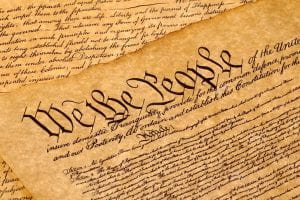Written by Benjamin Clanton, Government Publications
Constitution Day is observed every year on September 17 to commemorate the signing of the United States Constitution in 1787, which outlined how our federal government would operate and serves as both a functional and symbolic document for this nation and its ideals. It is possible that many people in modern day take for granted that the United States would become what it is today. However, when studying the history of the Constitution and its eventual ratification, Americans of the time debated over what the United States should actually be. Luckily, there are some easily accessible government resources available online that allow us to study the arguments for our Constitution. Perhaps the finest example of this is what has come to be known as ‘The Federalist Papers,’ which you can read in its entirety at the Library of Congress’s website. Alexander Hamilton, James Madison, and John Jay wrote a number of political treatises arguing the need for the Constitution and a more refined federal government to replace the existing Articles of Confederation (which you can view here). These writings provide a glimpse into the political and philosophical arguments and counterarguments of the day concerning the formation of the United States government.
As we know, Hamilton and his allies won the day and the Constitution was ratified; the website of the Architect of the Capitol provides a glimpse into this momentous event with a detailed explanation of the painting ‘Signing of the Constitution.’ It is also important to remember that the U.S. Constitution is an ever functioning document and not simply a historical moment frozen in time. The website of the United States Congress provides us with what is known as the Constitution Annotated, where interpretations of the Constitution are displayed, particularly in a list of laws that have been deemed unconstitutional by the Supreme Court. If you are interested in further research concerning the U.S. Constitution and its history, McWherter Library has a number of resources in its collections that are worth a look. And please visit our Constitution Day LibGuide, which highlights a number of resources available physically and online concerning the Constitution and its meaning, along with its relationship to the Census and voting rights.
Government Publications
- The American Solution: Origins of the U.S. Constitution – Library of Congress
- About America: The Constitution of the United States with Explanatory Notes – State Department
- The Citizen’s Almanac: Fundamental Documents, Symbols, and Anthems of the United States – U.S. Citizenship and Immigration Services
- Civics and Citizenship Toolkit : A Collection of Educational Resources for Immigrants – U.S. Citizenship and Immigration Services
- Celebrating the Bicentennial of the U.S. Constitution, 1987-1991 – Commission on the Bicentennial of the United States Constitution
General Collection
- Ratification: The People Debate the Constitution, 1787-1788 by Pauline Maier
- Beyond Confederation: Origins of the Constitution and American Identity (E-book)
- The Debate on the Constitution: Federalist and Antifederalist Speeches, Articles, and Letters During the Struggle Over Ratification
- The Creation of the American Republic, 1776-1787 by Gordon S. Wood (E-book)
- Unruly Americans and the Creation of the Constitution by Woody Holton
Constitution Day also doubles as Citizenship Day, to serve as a celebration of efforts by people from all over the world to become citizens. It highlights the beauty of our nation at its best, where people from countless backgrounds can gather and continue the ever-changing experiment that is the United States. U.S. Citizenship and Immigration Services provides a variety of resources that will help those interested in the road to citizenship. The Government Publications department also provides some valuable citizenship resources, such as online access to this Civics and Citizenship Toolkit. Another appropriate resource, being that it is both Constitution Day and Citizenship Day, are the translations of the U.S. Constitution into a variety of languages that we also provide. Some of the examples include: Spanish, French, German, Chinese, and Korean. Hopefully, the resources discussed in this post will help you gain a better understanding of why we commemorate these two vital aspects of the American story.
